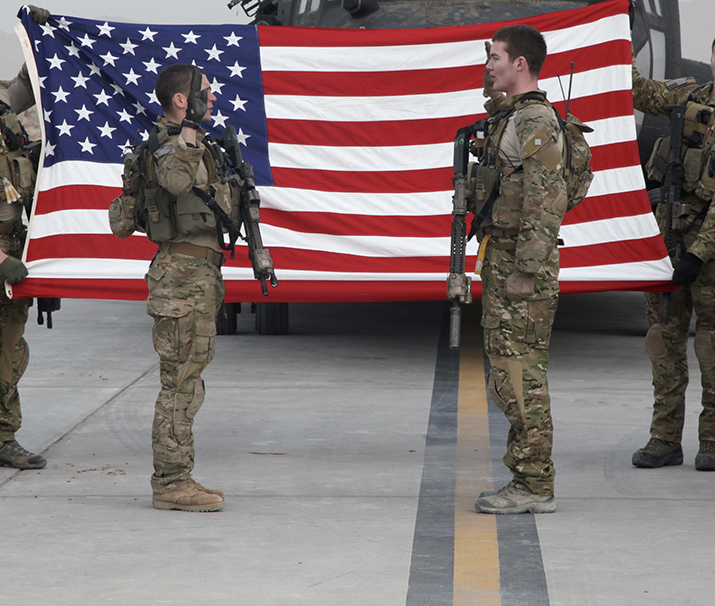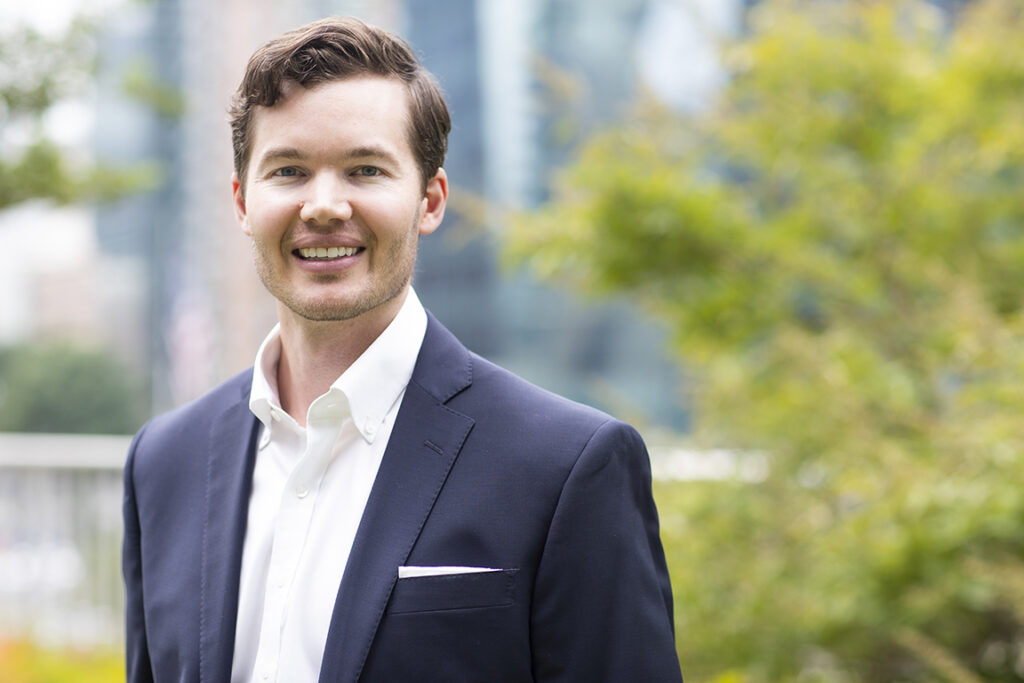On Sept. 11, 2001, Adam C. Johnson was in his sophomore classroom at T.F. Riggs High School in Pierre, S.D., watching the television as the terrorist attacks played out halfway across the country. That moment sealed Johnson’s commitment to serve.
Three years later he enrolled in the U.S. Military Academy in West Point, N.Y., where he ran hurdles on the Army track and field team and studied military strategy. His major, Irregular Warfare, studied contemporary guerilla tactics that would soon be directly applicable to his five total combat deployments to Iraq and Afghanistan.
The now 35-year-old former U.S. Army Ranger has an MBA (2016) from the Terry College and works as a director and management consultant at Jabian Consulting in Atlanta. As far away as that seems from those haunting images that flashed across the screen in his South Dakota classroom 20 years ago, Johnson sees the whole thread of his life as connected.
“After roughly six years and five deployments, I felt I accomplished what I set out to do,” Johnson says of his military service that brought him to Ft. Benning in Columbus after graduating from West Point. “That’s when I began to look at what’s next in my life, and I found that I wanted to stay in Georgia. Georgia’s flagship school really appealed to me for business school, and I ended up at Terry.”
When Johnson enrolled at West Point, he understood his mission from the start.
“I joined to serve,” he says. “At the time I started West Point in 2004, everyone who graduated was being deployed. In 2008, all my classmates and I knew within a year we would be in either Iraq or Afghanistan.”
So he focused his curriculum accordingly.
“I formally studied how to counter insurgencies and how to suppress guerilla warfare … which was obviously very applicable for when I deployed to both Iraq and Afghanistan,” he says. “Day one as a freshman, I knew I had four years to prepare, which is why I studied something very relevant to what I wanted to go do. My major was directly correlated to my future occupation. I felt good about that.”
Johnson graduated as a second lieutenant and reported to Fort Benning for training before his first deployment in 2009-10 as an Army infantry officer with the 82nd Airborne Division in western Iraq. He later joined the elite 75th Ranger Regiment, headquartered at Fort Benning, and made four more combat deployments as an Army Ranger in Afghanistan, leading Rangers on special operations.
“It was an extreme pleasure and privilege to lead men and women in combat and have the United States flag on my shoulder,” says Johnson, who rose to the rank of captain. “The amount of responsibility and commitment you have and the dedication and focus you need to be able to maintain while being deployed in special operations, there’s nothing like it. The best job in the world is leading Army Rangers in combat. That’s something I’ll always look back on fondly.”
When it came time to transition from the military in 2014, Johnson developed a bond with the network he calls his “Georgia family” and looked at his options to remain in state. The Terry College was making a big push to draw veterans into its MBA programs, and the business school seemed a perfect fit for Johnson.
“I wanted to go to a school where I could recreate myself and pursue a different career,” he says. “What appealed to me about UGA was a large university and Terry had a smaller program. So I thought I could get the best of both worlds … that combination of small college — in Terry you know every single person in your class — and huge university where you had a lot of resources and program opportunities.”
While making the transition from the structured life of active military duty to the unknown of a corporate career track seemed a daunting proposition at the outset, Johnson quickly realized how these two seemingly disparate worlds meshed.
“At the time going to business school, I didn’t understand how much of what I studied and what I did in the military correlates to corporate strategy and business operations,” he says. “Because I had limited business experience.”
Considering the focus of Terry’s MBA program included sustainability, analytics, innovation and leadership, the former Ranger brought more to the table than he initially thought. Johnson quickly realized the correlation between his military experience and corporate strategy.
“Leading, planning and prioritizing are among the best attributes that veterans will have because that’s in the nature of everything you do in the military,” Johnson says. “In the military, often you’re thrown into very complex, dangerous situations at the last minute and you have to figure out what is the most important thing to do — help manage the chaos and put order to it.”
Johnson cites as an example a start-up company: “It’s essentially starting in an existing industry and you’re the David to Goliath of the incumbent. That’s a lot of similarity to an insurgency when you have a small group of people fighting against the incumbent government. Same principles and doctrines.”
Johnson put his leadership skills to use at UGA. The university founded the Student Veterans Resource Center in 2013 to help ease the students’ transition from military service to the classroom and to facilitate career readiness. When Johnson arrived a year later, he struck up a relationship with the SVRC director, retired military officer Ted Barco. Johnson served as the third graduate assistant in the SVRC, helping to build it into one of the best resource centers for veterans in the country.
“That’s something the university should be proud of, the programs the SVRC built out and how it’s impacting so many veterans,” Johnson says.
“All (of our graduate assistants) were outstanding, and each brought a unique competency to the table that, in turn, helped the many student veterans that followed in their footsteps persist, graduate and prosper,” says Barco, now retired from UGA. “Because Adam spent two years with the SVRC, his impact was significant both as a student and an alumnus. With that said, all veterans — regardless of service or job role — bring something to UGA.”
Johnson agrees, especially in the business realm. “Military veterans are going to bring extensive leadership and operations experience as well as a different way of thinking which is why many corporations seek veterans.”

•••
After finishing his MBA, Johnson worked as a consultant for Cognizant, a technology and business consulting company, before joining Jabian Consulting in Atlanta. There he focused on strategy development and implementation for corporate clients, as well as data privacy compliance helping businesses navigate the emerging and complicated realm of data regulations and transparency.
It’s a challenge to identify all the legal obligations, as well as protect the financial and reputational interests of companies through data compliance. He emphasizes the “minimalization” strategy — collecting the least amount of data necessary to achieve an immediate and intended outcome — to reduce exposure, storage requirements and the cost of IT infrastructure.
“It’s a fun place to be at the intersection of policy and strategy in business,” he says.
His colleagues and clients laud Johnson’s “natural leadership” and his ability to “empower team members by offering constructive feedback and by building their confidence in being in tune with individual team member’s strengths.” He was selected as consultant of the year in his first year with Cognizant.
“When I work with corporate clients today, a lot of times I consider how we dealt with similar issues in the military, drawing from lessons I learned about strategy or operations,” Johnson says. “That’s the baseline for how I think in reverting back to what I learned at business school and West Point and applying those today.”
Midtown Atlanta is a long way from the dirt road in a small South Dakota community where he grew up, but it feels like home to Johnson.
“In South Dakota, your neighbors are your lifeline,” he says. “When there are blizzards or prairie fires, everyone comes together and helps each other out. That’s the sense of community I have in Midtown Atlanta. We build a community when there are issues in our neighborhood. Building community and working with neighbors is just as important regardless of where you live.”
Just as he was inspired to serve by the events of 9/11, he continues his service outside of the military. He serves on the board of the University of Georgia Alumni Association and is deeply involved in the community through the nonprofit Jabian Cares, Trinity Community Ministries, and Meals on Wheels Atlanta.
“The number one lesson from Terry is the importance of your network and being engaged with your community,” he says. “From Day One, the administration and professors stress not just learning the curriculum and doing well in business school but being active and known for something in the community and developing those relationships. I’m extremely close with my classmates from Terry six years later.”

